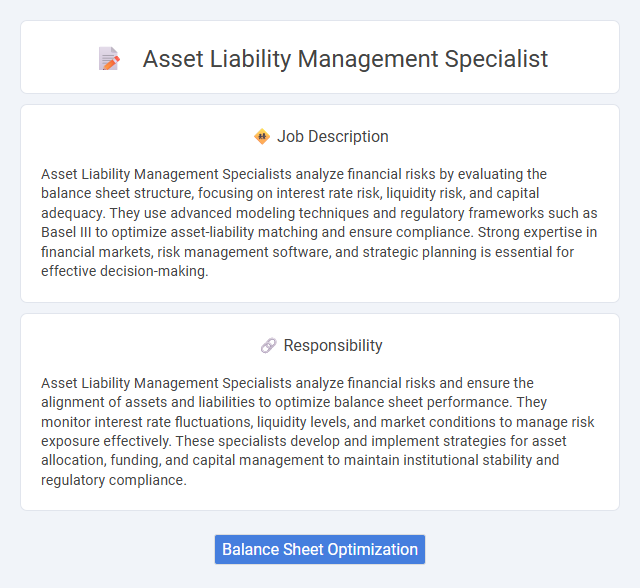
Asset Liability Management Specialists analyze financial risks by evaluating the balance sheet structure, focusing on interest rate risk, liquidity risk, and capital adequacy. They use advanced modeling techniques and regulatory frameworks such as Basel III to optimize asset-liability matching and ensure compliance. Strong expertise in financial markets, risk management software, and strategic planning is essential for effective decision-making.
Individuals with strong analytical skills and a keen interest in financial markets are likely to be well-suited for the role of an Asset Liability Management Specialist. Those comfortable working under pressure and managing complex data may find this job aligns with their abilities. Candidates lacking attention to detail or a solid understanding of risk management might face challenges performing effectively in this position.
Qualification
An Asset Liability Management Specialist typically requires a strong background in finance, economics, or risk management, supported by a bachelor's degree in these fields or related disciplines. Proficiency in quantitative analysis, financial modeling, and regulatory compliance is essential, often complemented by certifications such as CFA, FRM, or CPA. Experience with banking regulations, interest rate risk management, and software tools like ALM systems or advanced Excel enhances the ability to optimize balance sheet risks and align asset-liability strategies.
Responsibility
Asset Liability Management Specialists analyze financial risks and ensure the alignment of assets and liabilities to optimize balance sheet performance. They monitor interest rate fluctuations, liquidity levels, and market conditions to manage risk exposure effectively. These specialists develop and implement strategies for asset allocation, funding, and capital management to maintain institutional stability and regulatory compliance.
Benefit
An Asset Liability Management Specialist role likely offers competitive financial rewards due to the critical nature of managing an organization's balance sheet risks. Professionals in this position may benefit from career growth opportunities within finance and risk management sectors. Companies might also provide advanced training and exposure to sophisticated financial modeling tools, enhancing expertise and marketability.
Challenge
The role of an Asset Liability Management Specialist likely involves navigating complex financial risks by effectively balancing assets and liabilities to ensure organizational stability. Challenges may arise from rapidly changing market conditions and regulatory requirements that demand constant adaptation and precise forecasting. Success in this position probably depends on strong analytical skills and the ability to anticipate and mitigate potential financial discrepancies.
Career Advancement
Asset Liability Management Specialists play a critical role in maintaining the financial health of institutions by managing risk and ensuring balanced liquidity. Expertise in risk assessment, regulatory compliance, and financial modeling drives career advancement into senior risk management or treasury roles. Continuous skill enhancement in data analytics and financial instruments enables progression toward executive positions such as Chief Risk Officer or Director of Asset Liability Management.
Key Terms
Balance Sheet Optimization
An Asset Liability Management Specialist focuses on optimizing the balance sheet by aligning asset and liability profiles to enhance liquidity, minimize risk, and improve profitability. They use advanced financial modeling and risk assessment techniques to manage interest rate risk, liquidity gaps, and capital adequacy. Their expertise ensures regulatory compliance while supporting strategic decision-making for sustainable financial growth.
 kuljobs.com
kuljobs.com